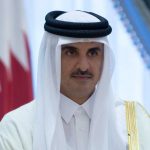Politics
Qatar Politics
This page explores Qatar’s political structure incorporating real-time RSS feed news and videos. By harnessing the power of RSS feeds, visitors can stay informed about the latest developments in Qatar’s politics as they happen. The dynamic nature of these feeds ensures that users receive up-to-the-minute updates on political events, policy changes, and significant milestones, enabling them to stay abreast of the ever-evolving political scene.

Sheikh Tamim bin Hamad Al Thani
Emir of Qatar
Reign 25 June 2013 – present
Image credit
Qatar is a sovereign country located in Western Asia, occupying a peninsula on the northeastern coast of the Arabian Peninsula. It is an absolute monarchy, with political power concentrated in the hands of the ruling Al Thani family. The political structure of Qatar is characterized by a hereditary system of government.
At the top of the political structure is the Emir of Qatar, who serves as both the head of state and the head of government. The Emir is the ultimate authority in Qatar and holds extensive powers, including the appointment of the Prime Minister and key government officials. The Emir’s decisions are final and binding, and he plays a crucial role in guiding the country’s political and foreign policy.
The Council of Ministers, also known as the Cabinet, assists the Emir in governing the country. The Prime Minister is appointed by the Emir and oversees the day-to-day administration of government affairs. The Council of Ministers consists of ministers who are responsible for different sectors and departments of the government.
Qatar has a unicameral legislature called the Advisory Council, also known as the Shura Council. However, its role is primarily advisory in nature, and it does not possess legislative authority. The Advisory Council consists of 45 members who are appointed by the Emir. The council members provide advice and recommendations to the government on various matters.
Political parties are not allowed in Qatar, and there are no national elections for public offices. However, the country has established a process for municipal elections, allowing Qatari citizens to participate in local governance and elect representatives to municipal councils.
Qatar’s political system is influenced by Islamic principles and traditions, and the country adheres to Sharia law. The Emir’s role as the guardian of Islam in Qatar is significant, and Islamic principles are incorporated into the country’s legal and social framework. It is important to note that Qatar has made efforts to modernize and diversify its economy, invest in infrastructure, and host major international events. The country has played an active role in regional and global affairs, including mediation efforts, humanitarian initiatives, and hosting diplomatic dialogues. Overall, Qatar’s political structure is characterized by an absolute monarchy, where political power rests with the ruling family. While the country has made progress in areas such as infrastructure and economic development, it has limited political participation and a centralized decision-making process.
Unless other sources are listed, original content is provided by ChatGPT. ChatGPT may produce inaccurate information about people, places, or facts. #Qatar #QatarPolitics #QatarNews #QatarNewsToday #QatarRSSFeed #BlahFace



